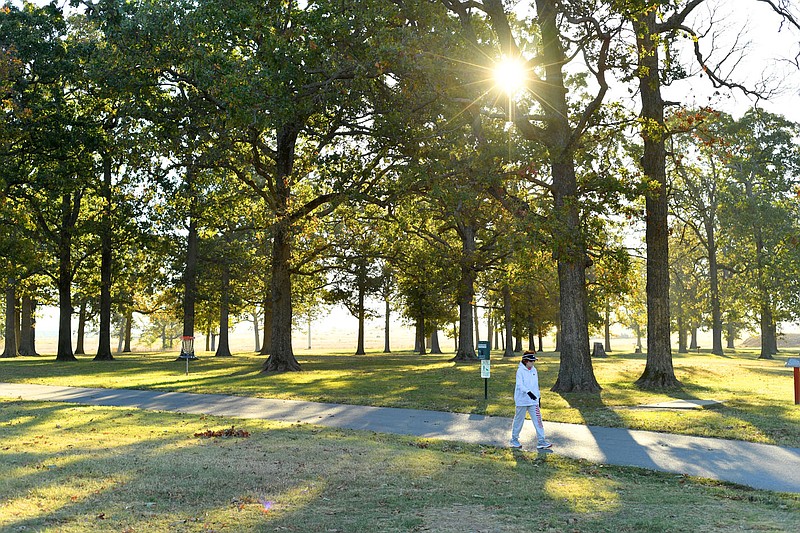BENTONVILLE -- Work to reconnect the Razorback Greenway through the new Interstate 49 interchange in north Bentonville has been approved and could start by the end of the year, according to city officials.
The greenway was severed in early August 2020 while the new interchange at U.S. 71B and I-49, part of the Bella Vista Bypass, was built. There is a makeshift, unofficial connection, but the work approved Tuesday night by Bentonville's City Council will rebuild the section permanently using a tunnel the Arkansas Transportation Department built as part of the interchange project, according to Hunter Garrison, bike and pedestrian planner for the city.
"We just approved the work at council so this is the Razorback Greenway/I-49 realignment. Right now, there's sort of a temporary, single track trail that people can use to connect, but that's never been the long-term solution," Garrison said.
The greenway will connect to the Wishing Springs Trail so users will have an uninterrupted journey from Bella Vista into Bentonville, he said.
The greenway is being moved slightly east of the old location to get it out of a floodplain. The Wishing Springs Trail connects with the Bella Vista Lake Trail north of the new interchange and with the North Bentonville Trail to the south.
"It's hard to connect the Bella Vista Lake Trail to the North Bentonville Trail and Wishing Springs right now," Garrison said. "That's kind of where the severing is or where the connection is missing because when the I-49 bypass was built, we got ARDOT to build the tunnel but the rest was on us."
Garrison said he's hoping to get construction started by the end of the year.
"It's coming into the holidays, so it's hard to say, but I would hope by the end of this year, early next year," Garrison said of the timing. "Then it'll take a minimum of six months to complete."
Weather could also be a factor, Garrison said.
"We can't really pour concrete unless it's going to sustain over 50 degrees for a good amount of time," he said.
"As part of this project, there's an old road bed that leads up to the tunnel, that'll be resurfaced and we will reutilize that and then the rest will be new concrete trail with a prefabricated bridge, which will span the [McKisic] creek bed at the North Bentonville Trail," Garrison said.
Garrison said the trail is in high demand. Prior to being severed, about 250,000 people used it annually.
"We're just really excited to get it underway. We know it's been in high demand," he said. "We're just excited to get the greenway back together."
Money for the project has all come from a series of grants.
"We have received $1.25 million in federal funding from the Northwest Arkansas Regional Planning Commission and the Arkansas Department of Transportation; these grants are part of an 80/20 match program," Garrison said. "The Walton Family Foundation is giving a grant of $505,452 for the 20% match. The total project cost is $1,755,452. Taxpayers pay zero."
Tim Conklin, assistant director at the planning commission, said the project is an example of how communities in the region have cooperated in recent years when divvying up grant money to get projects funded, rather than fighting among themselves. The greenway relocation project was given grant money over several cycles in order to have enough money to cover the work.
"It's been great to have the cities working that closely together and understanding each of their priorities but also the regional priorities and funding projects when they get close to being ready for construction," he said.
Conklin said $750,000 came from Transportation Alternatives Program grants through the planning commission and the Transportation Department awarded $500,000.
"Our communities have, over the last 10 funding cycles, all worked together to understand where projects are in the process and how they can move forward, and there's truly been cooperation among our communities to work together to deliver these projects," Conklin said. "We can't do everything at one time."
More News
NoneTransportation Alternatives Program
The Transportation Alternatives Program (TAP) provides grant money for a variety of generally smaller-scale transportation projects, such as pedestrian and bicycle facilities; construction of turnouts, overlooks, and viewing areas; community improvements, such as historic preservation and vegetation management; environmental mitigation related to stormwater and habitat connectivity; recreational trails; safe routes to school projects; and vulnerable road user safety assessments.
Source: Federal Highway Administration

